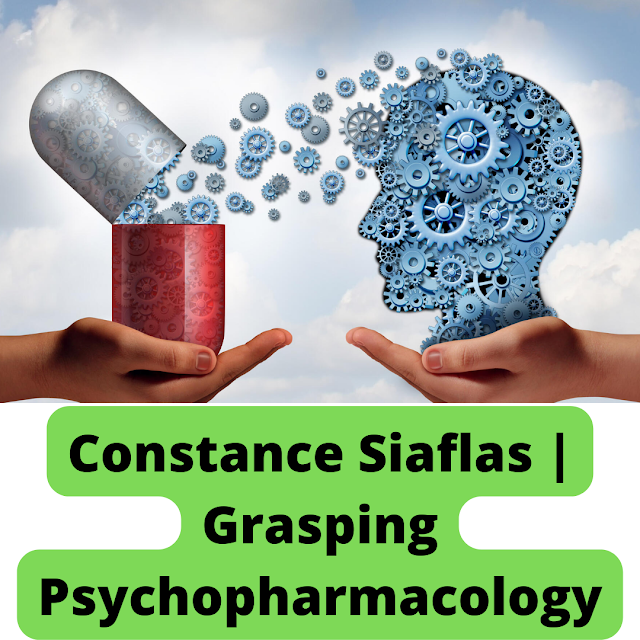Constance Siaflas | What is Clinical Psychopharmacology?
What is Clinical Psychopharmacology?
According to Constance Siaflas, the average number of adults in the United States reporting symptoms of anxiety or depressive disorders has increased during the pandemic. With a growing need for appropriate mental health care and access to competent clinical professionals, Psychopharmacology can provide an answer.
But what is clinical psychopharmacology? Simply put, clinical psychopharmacology is a branch of professional psychology that combines traditional psychology-based therapeutic practices with psychotropic medications to treat patients with mental disorders, including anxiety and depression.
With a master's degree in psychopharmacology, a licensed psychologist can integrate medication into the mental health management of their patients.
If you are interested in a career in psychopharmacology, read on to learn more about clinical psychopharmacology.
What Clinical Psychopharmacologists Do
The essential obligations of a clinical psychopharmacologist can ordinarily be broken down into three classes:
Evaluation - The psychopharmacologist will probably survey a patient's clinical history, ask about any side effects, and carry out any important clinical tests or blood tests to more readily figure out the patient's current state.
Interview - They may then choose to talk with a medical care group to decide the best strategy. This might incorporate the patient's consideration suppliers and any analysts or social laborers.
Remedy - After evaluation and meeting, a clinical psychopharmacologist will pick the right drug in light of their exploration to help the patient's side effects.
In this way, clinical psychopharmacologists might find it useful to remain refreshed on the most recent examination to pursue the most educated choices. Truth be told, this occupation will probably request that you continually reconsider your approaches and practices. Nonetheless, this is many times the most ideal way to guarantee your patient has a successful treatment plan.
Grasping Psychopharmacology
Constance Siaflas says A therapist might wish to seek a graduate degree in clinical psychopharmacology with the goal can offer a more extensive scope of care and treatment to their patients. Be that as it may, this field is complicated as it ordinarily requires a comprehension of fundamental neuroscience, pharmacokinetics, and pharmacodynamics.
A clinical psychopharmacologist likewise profits by comprehension of
- What Different Drugs Can Mean for Each Other
- What an individual's qualities can mean for drug use and viability
- How the body and medications interface with one another
- How long does a medication stay in the body
Notwithstanding, clinical psychopharmacology goes past realizing which
medications to endorse for which mental problem. It likewise separates the moral and moral obligation of recommending mental medications.
Turning into a Clinical Psychopharmacologist
All in all, what does it take to turn into a clinical psychopharmacologist? While prerequisites might differ relying upon the state you live in, as well as different variables, certain necessities are reliable in all cases.
For example, the typical planned clinical psychopharmacologist can benefit from
- Procuring a four-year certification in brain research-related study.
- Finishing a graduate degree or potentially a doctoral program in Clinical Psychopharmacology.
- Meeting their express board's rules and necessities to get their permit.
- Rehearsing for a specific measure of years as a therapist.
- Acquiring accreditations in their field that might build their procuring potential and work valuable open doors.
This training additionally normally requires you to breeze through a few tests throughout your preparation. In addition, your permit and any affirmations you might acquire may expect you to recharge or recertify like clockwork or somewhere in the vicinity.
Treating Mental Disorders
Constance Siaflas said Clinical psychopharmacology concentrates on how drugs can be utilized to change a patient's state of mind, conduct, and even considerations. A therapist might decide to seek after this course to more readily treat mental and temperament issues and conditions, for example,
- Uneasiness Disorder
- Burdensome Disorder
- Bi-Polar Disorder
- Alarm Disorder
- Schizophrenia
- Neurodevelopmental Disorder
- Substance Use Disorder
- Consideration Deficit/Hyperactivity Disorder
With a treatment plan that incorporates drug treatment, a patient might have the option to all more likely deal with their side effects on a step-by-step premise. Be that as it may, because specific prescriptions can change conduct, mindset, and contemplations, a lot of preparation and confirmation are significant while rehearsing in this field.





Comments
Post a Comment